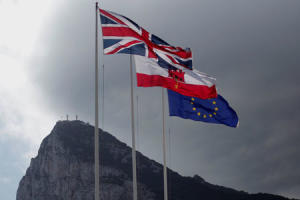EU lawmakers adopt Brexit resolution, reject pro-Gibraltar hint
STRASBOURG (Reuters) - European Union lawmakers adopted a resolution on Wednesday setting their red lines for the two-year divorce talks with Britain and rejected attempts by British MEPs to recognize Gibraltar's pro-EU stance in the Brexit referendum.
In a display of EU unity, the legislature' text repeated the same priorities set by the EU summits' chair Donald Tusk in his draft negotiating guidelines released last week.
The European Parliament wants talks on Britain's future relations with the EU to start only after "substantial progress" is made on the bill for Brexit bill, on the Irish border, and on the rights of the 3 million EU citizens in Britain and the one million British residents in EU countries.
The text was backed by more than two-thirds of the deputies in the parliament, which will have to approve any deal with the United Kingdom.
Britain's Under Secretary for Brexit Robin Walker said this was "a positive move" although Britain would prefer to start trade talks as soon as possible. He told reporters at the session in Strasbourg that Britain will also put citizens' rights first in the Brexit process.
In a minor departure from Tusk's text, the parliament's resolution hinted at the possibility for Britain to reverse the Brexit process, stressing however that this would be possible only with the approval of all the remaining 27 member states.
"The door is open if Britain changes its mind," Gianni Pittella, head of the center-left grouping, the second largest in the parliament, told reporters. The Greens expressed a similar wish.
The move was aimed at strengthening the hand of the 48 percent of Britons who voted against Brexit in last year's referendum, but was opposed by the EU chief negotiator on Brexit, Michel Barnier, parliament officials said.
The conservative grouping, the largest in the legislature, tried to distance itself from such a statement, although they backed the resolution. "Leave means leave," the conservatives' leader Manfred Weber said.
The resolution also allowed transitional arrangements to smooth the UK's departure, but they should not last more than three years. MEPs also insisted that at the end of the process Britain cannot expect better conditions than when it was an EU member.
GIBRALTAR
Lawmakers rejected two nearly identical amendments that would have added to the text a reference to Gibraltar's pro-EU vote in last year's Brexit referendum, a move meant to recall its residents back the EU but also prefer to remain in Britain.
The rocky British enclave on the southern Spain coast caused a harsh controversy after Tusk's guidelines gave Madrid a say in the future relationship between Gibraltar and the EU after Britain leaves the bloc.
Gibraltar rejected the idea of Britain sharing sovereignty with Spain by 99 percent to 1 percent in a 2002 referendum, but voted overwhelmingly to remain part of the EU in last June's Brexit vote.
The changes proposed by British Conservative lawmakers in the EU parliament and by a cross-party group of MEPs wanted to highlight that Gibraltar voted against Brexit.
They also wanted to add a reference to the enclave in a paragraph saying that a majority of electors in Scotland and Northern Ireland voted to stay in the EU.
The main groupings in the parliament opposed this change because "we do not agree to give to the Gibraltar issue the same importance as Scotland's and Northern Ireland's", a parliament official said.
Other amendments proposed by the United Kingdom Independence Party (UKIP) euroskeptic grouping, deploring Tusk's guidelines on Gibraltar, were also widely rejected.
(Reporting by Francesco Guarascio; Editing by Tom Heneghan)


No comments:
Post a Comment